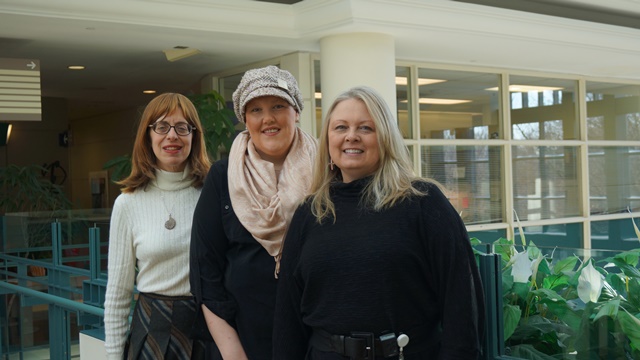“It is important to stay positive,” says Katie Munro who was diagnosed with breast cancer a week before her 34th birthday. An early childhood educator, her biggest passion is working with children. “Between my sisters and I,” she says, “I was the one everyone thought would be a mom first.” Five months after being diagnosed, Katie and her sisters lost their mother to the same disease. “It has been surreal. Life-changing. We are still working through our grief.” And yet her mother’s passing has made Katie even more determined to stay strong and stay focused.
Being young and single, coping with a cancer diagnosis and undergoing treatment has been a challenging journey for Katie. Her circle of friends are very supportive but they are not living through the tumultuous changes she is. She also wonders about finding someone to settle down with, and hopes to start a family when her life returns to a new normal.
Katie is a patient in PYNK: Breast Cancer Program for Young Women at the Louise Temerty Breast Cancer Centre at Sunnybrook, the first program of its kind in Canada to address the special clinical, psychological, research and educational needs of younger women with breast cancer. PYNK helps these women cope better through extra support (a dedicated oncology nurse, and focused support programs) and conducts research to help future patients.
MORE: EBOLA: IS CANADA PREPARED?
“Women aged 40 and younger represent only seven per cent of all breast cancer patients, but are generally more affected by the diagnosis,” says Dr. Ellen Warner, founder and director of the PYNK program and a medical oncologist with Sunnybrook’s Odette Cancer Program Breast Cancer Care team.
Studies show younger women are more likely to be diagnosed with aggressive disease and as a result, generally need more aggressive treatment. They are at greatest risk of psychological and social distress due to their life stage. Often, they face the diagnosis while coping with a new relationship or recent marriage, school or emerging careers. They tend to experience greater social isolation, and more body image issues after treatment than their older counterparts. And because most of these younger women will need chemotherapy, which damages the ovaries and often leads to infertility, those who have not yet completed their families are concerned about preserving their fertility prior to starting treatment.
Katie consulted with the team at PYNK and arranged to have her unfertilized eggs frozen, before having chemotherapy. She also opted for double mastectomy surgery given the strong familial link – she also lost an aunt to breast cancer – and plans to have breast reconstruction next year. “It’s not your life,” she declares. “It’s only a bit of your life.”
“We need to better understand the biology of breast cancer in younger populations to guide more optimal treatment, and build on unique psychosocial supports to improve quality of life for these women,” says Dr. Warner.
MORE: HELPING HANDS NEEDED IN A WORLD WITHOUT TOUCH
Dr. Warner is leading two studies, SPOKE and GYPSY, to improve fertility preservation opportunities and decision-making for young patients. This work is part of a national research program on breast cancer in young women funded by the government of Canada and the Canadian Breast Cancer Foundation that will also help improve local therapies, and expand the scope of genetic testing (younger breast cancer patients are more likely than older women to have an inherited genetic abnormality leading to cancer).
Over the next four years, researchers in this national program will engage 1,200 young women from across the country with a new diagnosis of breast cancer, to participate in a first of its kind anonymized cohort study that will track and correlate risk factors, family history, tumour tissue and blood samples. This invaluable resource will help future researchers test the validity and usefulness of a newly discovered factor that is hypothesized to potentially increase breast cancer risk, or alter its outcome.
“When I was diagnosed, it was very frightening. As someone so young with cancer, I felt I was the only one going through it. When I met other young women in the clinic, I realized I wasn’t alone. It’s been so inspirational to exchange stories, share experiences and support one another, and Dr. Warner and Christel Helwig at PYNK have had a huge role in keeping things positive.“




